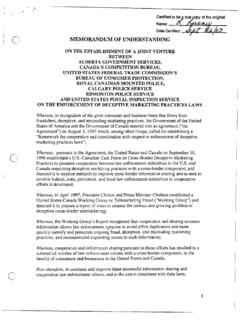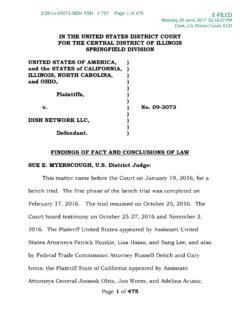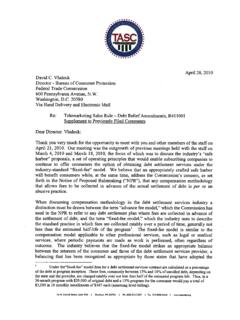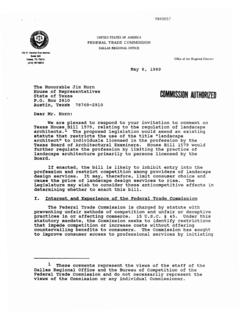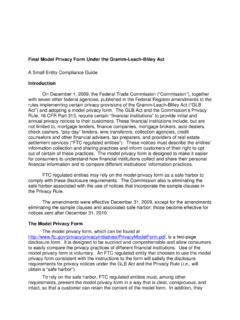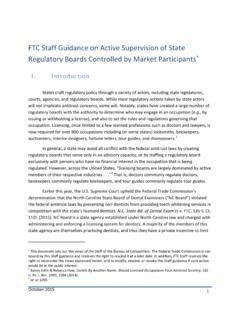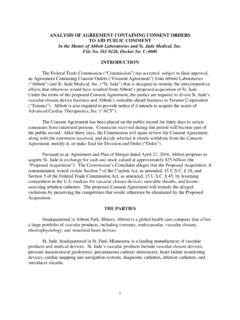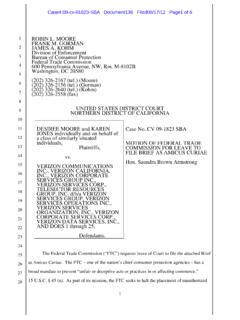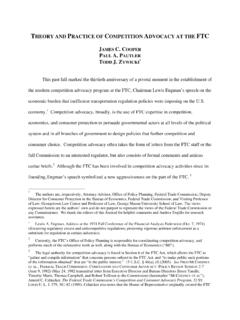Transcription of Advertising and Marketing on the Internet
1 Advertising and Marketingon the InternetRules of the RoadFederal trade CommissionBureau of Consumer ProtectionSeptember 2000 InsideGeneral Offers and ClaimsProtecting Consumers Privacy OnlineLaws Enforced by the federal trade CommissionBusiness OpportunitiesCredit and Financial IssuesEnvironmental ClaimsFree ProductsJewelryMail and Telephone OrdersNegative Option Offers900 NumbersTelemarketingTestimonials and EndorsementsWarranties and GuaranteesWool and Textile ProductsMade in the More InformationYour Opportunity to Comment1 The Internet is connecting advertisers and marketers to customers from Boston to Bali with text,interactive graphics, video and audio. If you re thinking about Advertising on the Internet ,remember that many of the same rules that apply to other forms of Advertising apply toelectronic Marketing .
2 These rules and guidelines protect businesses and consumers and helpmaintain the credibility of the Internet as an Advertising medium. The federal TradeCommission (FTC) has prepared this guide to give you an overview of some of the laws of the RoadWHO S REACHING A GLOBAL MARKET?ADVERTISERS ON THE MUST TELLTHE TRUTH AND NOTMISLEAD ADDITION, CLAIMSMUST BE OFFERS AND CLAIMS PRODUCTS AND SERVICESThe federal trade commission Act allows the FTC to act in the interest of all consumers toprevent deceptive and unfair acts or practices . In interpreting Section 5 of the Act, theCommission has determined that a representation, omission or practice is deceptive if it is likelyto:lmislead consumers andlaffect consumers behavior or decisions about the product or addition, an act or practice is unfair if the injury it causes, or is likely to cause, is:lsubstantiallnot outweighed by other benefits andlnot reasonably FTC Act prohibits unfair or deceptive Advertising in any is, Advertising must tell the truth and not mislead claim can be misleading if relevant information is leftout or if the claim implies something that s nottrue.
3 For example, a lease advertisementfor an automobile that promotes $0 Down may be misleading if significantand undisclosed charges are due atlease addition, claims must be substantiated,especially when they concern health, safety, orperformance. The type of evidence may depend on theproduct, the claims, and what experts believe necessary. If yourad specifies a certain level of support for a claim tests show X you must have at least that level of are responsible for claims they make about their products and services. Thirdparties such as Advertising agencies or website designers and catalog marketers alsomay be liable for making or disseminating deceptive representations if they participate in thepreparation or distribution of the Advertising , or know about the deceptive agencies or website designers are responsible for reviewing theinformation used to substantiate ad claims.
4 They may not simply rely on anadvertiser s assurance that the claims are substantiated. In determining whether an adagency should be held liable, the FTC looks at the extent of the agency s participationin the preparation of the challenged ad, and whether the agency knew or should haveknown that the ad included false or deceptive of the RoadlTo protect themselves, catalog marketers should ask for material to back up claimsrather than repeat what the manufacturer says about the product. If the manufacturerdoesn t come forward with proof or turns over proof that looks questionable, thecatalog marketer should see a yellow caution light and proceed appropriately,especially when it comes to extravagant performance claims, health or weight losspromises, or earnings guarantees.
5 In writing ad copy, catalogers should stick to claimsthat can be supported. Most important, catalog marketers should trust their instinctswhen a product sounds too good to be points to consider:lDisclaimers and disclosures must be clear and conspicuous. That is,consumers must be able to notice, read or hear, and understand theinformation. Still, a disclaimer or disclosure alone usually is not enough toremedy a false or deceptive must show how the product will perform under normal must be made to dissatisfied consumers if you promised to directed to children raises special issues. That s becausechildren may have greater difficulty evaluating Advertising claims andunderstanding the nature of the information you provide.
6 Sellers should takespecial care not to misrepresent a product or its performance whenadvertising to children. The Children s Advertising Review Unit(CARU) of the Council of Better Business Bureaus has publishedspecific guidelines for children s Advertising that you may find Com Disclosures: Information About Online Advertising , an FTCstaff paper, provides additional information for online paper discusses the factors used to evaluate the clarity andconspicuousness of required disclosures in online ads. It alsodiscusses how certain FTC rules and guides that use termslike writing or printed apply to Internet activities andhow technologies such as email may be used to complywith certain rules and on Dot Com Disclosures: Information About Online of the RoadPROTECTING CONSUMERS PRIVACY ONLINEThe Internet provides unprecedented opportunities for the collection and sharing of informationfrom and about consumers.
7 But studies show that consumers have very strong concerns aboutthe security and confidentiality of their personal information in the online marketplace. Manyconsumers also report being wary of engaging in online commerce, in partbecause they fear that their personal information can be consumer concerns present an opportunity for you tobuild on consumer trust by implementing effectivevoluntary industry-wide practices to protect consumers information privacy. The FTC has held a number ofworkshops for industry, consumer groups and privacyadvocates to explore industry guidelines to protectconsumers privacy June 1998, the FTC issued Online Privacy: A Reportto Congress. The Report noted that while over 85 percentof all websites collected personal information fromconsumers, only 14 percent of the sites in the FTC srandom sample of commercial websites provided anynotice to consumers of the personal information theycollect or how they use it.
8 In May 2000, the FTC issueda follow-up report, Privacy Online: Fair InformationPractices in the Electronic Marketplace. While the 2000survey showed significant improvement in the percent ofwebsites that post at least some privacy disclosures, only 20percent of the random sample sites were found to have implemented four fair informationpractices: notice, choice, access and security. Even when the survey looked at the percentage ofsites implementing the two critical practices of notice and choice, only 41 percent of the randomsample provided such privacy disclosures. You can access the FTC s privacy report Children s Online Privacy Protection Act (COPPA) and the FTC s implementing Rule tookeffect April 21, 2000.
9 Commercial websites directed to children under 13 years old or generalaudience sites that have actual knowledge that they are collecting information from a child mustobtain parental permission before collecting such FTC also launched a special site at to help children, parents andsite operators understand the provisions of COPPA and how the law will affect of the RoadLAWS ENFORCED BY THE federal trade COMMISSIONL isted here are some FTC laws about specific Marketing practices and the promotion ofproducts and services in specific industries. For copies of the rules and commentaries relevantto your Internet enterprise, contact: Consumer Response Center, federal trade commission ,Washington, DC 20580; toll-free: 1-877-FTC-HELP (382-4357); TDD: 202-326-2502.
10 Or visitthe FTC at OpportunitiesThe Franchise and Business Opportunity Rule requires franchise and business opportunitysellers to give consumers a detailed disclosure document at least 10 days before the consumerpays any money or legally commits to a purchase. The document must include:lthe names, addresses, and telephone numbers of other purchasers;la fully-audited financial statement of the seller;lthe background and experience of the business s key executives;lthe cost of starting and maintaining the business; andlthe responsibilities of the seller and purchaser once the purchase is addition, companies that make earnings representations must give consumers the written basisfor their claims, including the number and percentage of owners who have done at least as wellas on Franchise Rule and Business Opportunity Marketing (MLM)MLM also known as network or matrix Marketing is a way ofselling goods and services through distributors.
